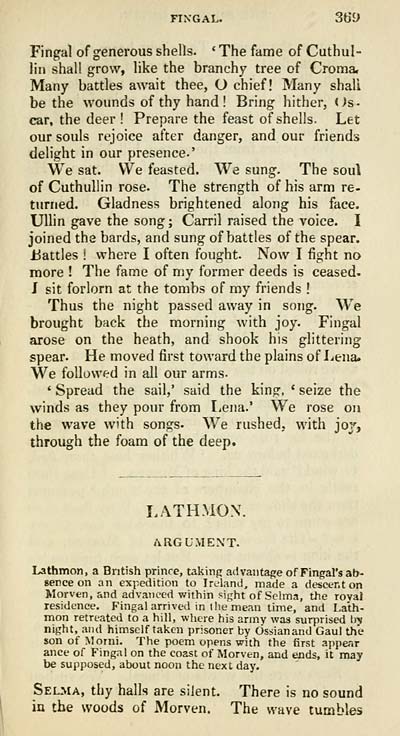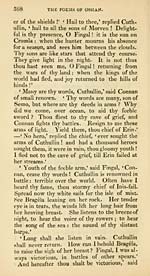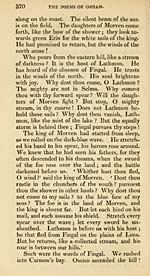Ossian Collection > Poems of Ossian
(381)
Download files
Complete book:
Individual page:
Thumbnail gallery: Grid view | List view

FINGAL. 369
Fingal of generous shells. * The fame of Cuthul-
lin shall grow, like the branchy tree of Croma,
Many battles await thee, O chief! Many shall
be the wounds of thy hand! Bring hither, Os-
car, the deer ! Prepare the feast of shells. Let
our souls rejoice after danger, and our friends
delight in our presence.'
We sat. VVe feasted. We sung. The soul
of CuthuUin rose. The strength of his arm re-
turned. Gladness brightened along his face.
UUin gave the song ; Carril raised the voice. I
joined the bards, and sung of battles of the spear.
±5attles ! where I often fought. Now I fight no
more ! The fame of my former deeds is ceased.
J sit forlorn at the tombs of my friends !
Thus the night passed away in song. W^e
brought back the morning with joy. Fingal
arose on the heath, and shook his glittering
spear. He moved first toward the plains of Lena.
We followed in all our arms.
' Spread the sail,' said the king, ' seize the
winds as they pour from Lena.' We rose on
the wave with songs. We rushed, with joj,
through the foam of the deep.
LATHMON.
/iRGU.MEN'T.
Lathmon, a British prince, takinp advantage of Fingal's ab-
sence on an expedition to Ireland, made a descent on
Morven, and advanced within sight of Sclma, the roval
residence. Fingal arrived in 1 lie mean time, and Lath-
mon retreated to a hill, where his army was surprised by
night, and himself taken prisoner by Ossianand Gaul the
son of Morni. The poem opens with the first appear
ance of Fingal on the coast of Morven, and ends, it may
be supposed, about noon the next day.
Selma, thy halls are silent. There is no sound
in the woods of Morven. The wave tumbles
Fingal of generous shells. * The fame of Cuthul-
lin shall grow, like the branchy tree of Croma,
Many battles await thee, O chief! Many shall
be the wounds of thy hand! Bring hither, Os-
car, the deer ! Prepare the feast of shells. Let
our souls rejoice after danger, and our friends
delight in our presence.'
We sat. VVe feasted. We sung. The soul
of CuthuUin rose. The strength of his arm re-
turned. Gladness brightened along his face.
UUin gave the song ; Carril raised the voice. I
joined the bards, and sung of battles of the spear.
±5attles ! where I often fought. Now I fight no
more ! The fame of my former deeds is ceased.
J sit forlorn at the tombs of my friends !
Thus the night passed away in song. W^e
brought back the morning with joy. Fingal
arose on the heath, and shook his glittering
spear. He moved first toward the plains of Lena.
We followed in all our arms.
' Spread the sail,' said the king, ' seize the
winds as they pour from Lena.' We rose on
the wave with songs. We rushed, with joj,
through the foam of the deep.
LATHMON.
/iRGU.MEN'T.
Lathmon, a British prince, takinp advantage of Fingal's ab-
sence on an expedition to Ireland, made a descent on
Morven, and advanced within sight of Sclma, the roval
residence. Fingal arrived in 1 lie mean time, and Lath-
mon retreated to a hill, where his army was surprised by
night, and himself taken prisoner by Ossianand Gaul the
son of Morni. The poem opens with the first appear
ance of Fingal on the coast of Morven, and ends, it may
be supposed, about noon the next day.
Selma, thy halls are silent. There is no sound
in the woods of Morven. The wave tumbles
Set display mode to: Large image | Transcription
Images and transcriptions on this page, including medium image downloads, may be used under the Creative Commons Attribution 4.0 International Licence unless otherwise stated. ![]()
| Early Gaelic Book Collections > Ossian Collection > Poems of Ossian > (381) |
|---|
| Permanent URL | https://digital.nls.uk/77577057 |
|---|
| Description | Selected books from the Ossian Collection of 327 volumes, originally assembled by J. Norman Methven of Perth. Different editions and translations of James MacPherson's epic poem 'Ossian', some with a map of the 'Kingdom of Connor'. Also secondary material relating to Ossianic poetry and the Ossian controversy. |
|---|
| Description | Selected items from five 'Special and Named Printed Collections'. Includes books in Gaelic and other Celtic languages, works about the Gaels, their languages, literature, culture and history. |
|---|

